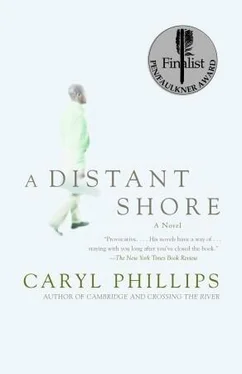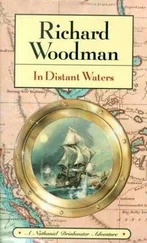Caryl Phillips
A Distant Shore
England has changed. These days it’s difficult to tell who’s from around here and who’s not. Who belongs and who’s a stranger. It’s disturbing. It doesn’t feel right. Three months ago, in early June, I moved out here to this new development of Stoneleigh. None of the old villagers seem comfortable with the term “new development.” They simply call Stoneleigh the “new houses on the hill.” After all, our houses are set on the edge of Weston, a village that is hardly going to give up its name and identity because some developer has seen a way to make a quick buck by throwing up some semi-detached bungalows, slapping a carriage lamp on the front of them and calling them “Stoneleigh.” If anybody asks me I just say I live in Weston. Everybody does, except one or two who insist on writing their addresses as “Stoneleigh.” The postman told me that they add “Weston” as an afterthought, as though the former civilises the latter. He was annoyed, and he wanted me to know that once upon a time there had been a move to change the name of Weston to Market Weston, but it never caught on. He was keen that I should understand that there was nothing wrong with Weston, and once he started I could hardly get him to stop. That was last week when he had to knock on the door for he had a package that wouldn’t fit through the letterbox, and he said that he didn’t want to squash it up (“You never know what’s in it, do you, love?”). He told me that he had been instructed by head office to scratch out the name “Stoneleigh” if it appeared on any envelopes. Should the residents turn out to be persistent offenders, then he was to politely remind them that they lived in Weston. But he told me that he didn’t think that he would be able to do this. That actually if they wanted to live in cloud-cuckoo land, then who was he to stop them? He didn’t tell this to his boss, of course, because that would have been his job. There and then, on the spot.
So our village is divided into two. At the bottom of the hill there is a road that runs west to the main town which is five miles away, and east towards the coast which is about fifty miles away. Everybody knows this because just before you enter Weston from the town side there’s a sign that says it’s fifty miles to the coast. Then after that there’s the big sign that reads “Weston” and announces the fact that we are twinned with some town in Germany and a village in the south of France. In the estate agent’s bumf about “Stoneleigh” it says that during the Second World War the German town was bombed flat by the RAF, and the French village used to be full of Jews who were all rounded up and sent to the camps. I can’t help feeling that it makes Weston seem a bit tame by comparison. Apparently, the biggest thing that had ever happened in Weston was Mrs. Thatcher closing the pits, and that was over twenty years ago.
The only history around these parts is probably in the architecture. The terraces on both sides of the main road are typical miners’ houses, built of dull red brick; the original inhabitants would have had to bathe in the kitchen, and their toilets would have been at the end of the street. However, these houses have all long since been replumbed, and the muck has been blasted off the faces of most of them so that they now look almost quaint. Mind you, the people who live down there still have to deal with the noise of the traffic at all times of day and night, and I imagine it’s murder to keep the windows clean. Besides the terraced houses there’s a petrol station, a fishand-chip shop, a newsagent-cum-grocery store, a sub-post office that opens three mornings a week, and behind the far row of houses a pub that sits smack on the canal, which runs parallel to the main road. There’s also a small stone church, with nicely tended grounds, but I won’t be needing to go in there. Stoneleigh is up a short steep hill and it overlooks the main road. We’re the newcomers, or posh so-andsos, as I heard a vulgar woman in the post office call us. There are not that many of us, just two dozen bungalows arranged in two culs-de-sac, but there are plenty of satellite dishes, and outside some of the houses there are two cars. Me, I don’t drive. We don’t have any shops up here, so if I do want anything I have to trek down the hill to the newsagent-cum-grocery store. Either that or catch the bus the five miles into town.
In May, I retired as a schoolteacher. Four years ago the school went comprehensive and since then standards have plummeted. It left me in a bit of a spot as I’ve spent most of my life banging on about how it would be better if kids of all levels and backgrounds could be educated together and learn from each other. It’s what Dad believed. He hated seeing the grammar-school boys in their white shirts and ties, and their flash blazers, while the kids from the secondary modern could barely find a pair of socks that matched. I can still see him shaking his head and pointing. “Class war, love,” he’d say. “Class war before they’re even out of short pants.” And then four years ago, the education authority scrapped grammar schools, turned us comprehensive, and they put me to the test. I was suddenly asked to teach whoever came into the school — we all were. Difficult kids I don’t mind, but I draw the line at yobs. But then early retirement came along to save me, and when I saw the Stoneleigh advert in the paper I thought, why not, a change is as good as a rest. Four weeks later, I found myself standing at the door to this place and handing the removal men a twenty-pound tip. I watched the dust rise and then slowly cloud as their big van pulled away. It was only six o’clock and so I thought that rather than sort through my belongings and arrange everything, I’d wander down the hill and take a good look around.
I was surprised by how busy the main road was, with big lorries thundering by in both directions. It took a good while before there was a break in the traffic and I was able to dash across. As it turned out there was not much to see, except housewives sitting on their front steps sunning themselves, or young kids running around. Doors were propped wide open, presumably because of the heat, but I didn’t get the impression that the open doors were indicative of friendliness. People stared at me like I had the mark of Cain on my forehead, so I pressed on and discovered the canal. It’s a murky strip of stagnant water, but because I was away from the noise of traffic, and the blank gawping stares of the villagers, it looked almost tolerable. The skeletal remains of a few barges were tied up by the shoreline, and it soon became clear that the main activity in these parts appeared to be walking the dog. In the fields, the cows and sheep moved with an ease which left me in no doubt that, despite the public footpath that snaked across the farmer’s land, this was their territory. I sat on a low wall underneath some drooping willow branches and looked around. The soft back-lap of the canal was soothing, although the jerky flight of a dragonfly buzzing about my head seemed out of place. This wall belonged to the village pub, The Waterman’s Arms, whose garden gave out onto the canal. In the garden some young louts and their girlfriends were braying and chasing about the place. I watched them as they began to toss beer at each other, and then shriek with the phlegmy laughter of hardened smokers. I didn’t want them to think that I was staring at them, so I turned my attention back to the relative tranquillity of the dank canal, and so time passed.
As the sun began to set, and the second dead fish floated by, the silver crescent of its bloated stomach gracelessly breaching the surface, I decided that I would quite like a drink. My throat was parched, and so I stood up and walked towards the pub. I could now feel eyes upon me, and for a few moments I wondered if some of these slovenly youngsters, with their barrack-room language, weren’t pupils that I’d recently had the rare pleasure of teaching. However, I thought it best not to turn and look them full in the face, and I therefore made my way, without an escort and with eyes lowered, across the garden and up the half-dozen stone steps and into the public bar. Once inside I discovered that the small room was deserted, save for a courting couple snug in the corner, whose feverishly interlaced fingers suggested what was to come.
Читать дальше











![Карен Кингсбери - A Distant Shore [calibre]](/books/384306/karen-kingsberi-a-distant-shore-calibre-thumb.webp)
